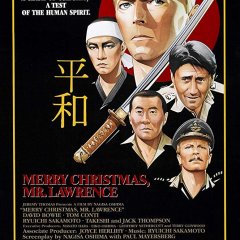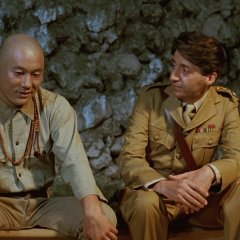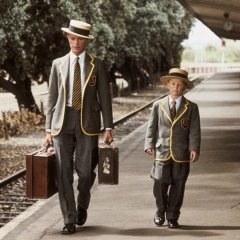 An Ultra Fan's Guide to Kitano Takeshi
An Ultra Fan's Guide to Kitano Takeshi The movie is set in the Second World War in a Japanese war camp, and explores the complex and ambiguous affinity between captors and prisoners. The two parties, already enemies because of the war, are driven apart because of many cultural differences: for example, their different concepts of honor and shame. The westerners find the Japanese inhumane and cruel, while the Japanese find the prisoners lazy and depraved. However, John Lawrence, a british officer, speaks fluently Japanese, and is the only character that manages to have a broader vision and serve as an intermediate between the Japanese and the western prisoners. Jack Celliers is a cool, willful soldier that resists to the Japanese pressure. Captain Yonoi is the camp commandant, who develops a secret and mysterious fascination for Jack Celliers. He is a conflicted character, driven by an unrelentingly strict sense of duty and the samurai code. Sergeant Hara is a character with whom John Lawrence develops a friendship of sorts beyond their cultural differences, although Hara occasionally shows himself shockingly brutal. (Source: MyDramaList) ~~ Adapted from the book "The Seed and the Sower" by Laurens van der Post. ~~ Co-production with U.K. and New Zealand. Edit Translation
- English
- magyar / magyar nyelv
- dansk
- Norsk
- Native Title: 戦場のメリークリスマス
- Also Known As: Prisoner of War , Merry Christmas on the Battlefield , Furyo , Senjo no Meri Kurisumasu , Senjou no Merii Kurisumasu , せんじょうのメリークリスマス , 俘虜
- Screenwriter & Director: Oshima Nagisa
- Genres: Historical, Psychological, Drama, War
Cast & Credits
- Beat Takeshi Main Role
- Sakamoto Ryuichi Main Role
- David BowieCelliersMain Role
- Iijima DaisukeCorporal UekiSupport Role
- Murota Hideo[New Commandant of Camp]Support Role
- Mikami Hiroshi[Japanese Soldier]Support Role
Reviews

Merry Christmas
Unattainability. No other word so clearly defines Merry Christmas, Mr. Lawrence. Unattainable pursuits for perfection, connection and forgiveness. An affecting and hauntingly beautiful experience about finding common ground even in the most hellish of circumstances, an undercurrent of revolutionary discourse in masculinity subversion bubbles furiously throughout the film deepening its already poignant lamentations about war's humanity-stripping effect and the self-imposed prisons that are obsession, honour and shame. Cultural divide and human nature encapsulate Nagisa Ōshima's film and one that he directs with the utmost care and attention, every shot is purposeful and framed with an immaculate beauty. It's relentlessly grim, constantly off-balance, periodically moving and continually striking thanks to Tōichirō Narushima's enchanting photography. There's a certain mystical quality to the performances of Bowie and Sakamoto both as arresting as each other, most likely a causality of their star power as musicians. However, it's the all-too-human reflections of Kitano and Conti that make this a true tearjerker with the duo sharing the film's final and most powerful moment, sometimes all it takes is a "Merry Christmas" to get the tears flowing. The real kicker for many is the film's utterly intoxicating musical score by Sakamoto; it stays with you long after viewing, conjuring up an atmosphere of regret, lost love and repressed heartbreak that we see in Yonoi's unrequited love for Celliers bloom. One of the most powerful pleas for tolerance ever committed to celluloid, Merry Christmas, Mr. Lawrence is one of the most captivating and mournful looks at the atrocities man commits to himself, so much is said without words, sometimes just emotions are enough. One that acquires depth and emotional scope the more you dwell on it, I should know, I've been thinking about this film since I first watched it two years ago and it's every bit a masterpiece now as it was back then.






















































